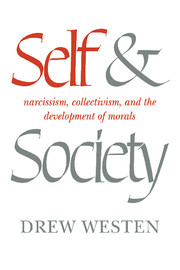Book contents
- Frontmatter
- Contents
- Preface
- Part I A theory of personality
- 1 Personality theory: the three faces of psyche
- 2 Emotion: a missing link between psychodynamic and cognitive-behavioral psychology?
- 3 The structure and dynamics of personality
- 4 The development of personality, narcissism, and moral judgment
- Part II A theory of culture
- Part III Personality and culture: a synthesis
- References
- Index
2 - Emotion: a missing link between psychodynamic and cognitive-behavioral psychology?
Published online by Cambridge University Press: 11 November 2009
- Frontmatter
- Contents
- Preface
- Part I A theory of personality
- 1 Personality theory: the three faces of psyche
- 2 Emotion: a missing link between psychodynamic and cognitive-behavioral psychology?
- 3 The structure and dynamics of personality
- 4 The development of personality, narcissism, and moral judgment
- Part II A theory of culture
- Part III Personality and culture: a synthesis
- References
- Index
Summary
Over three decades have passed since the pioneering efforts by Dollard and Miller (1950) to effect a rapprochement between behaviorist and psychodynamic psychology. Since that time, the two psychologies have largely gone their separate ways (though one may find an occasional joint communique in which the two camps pursue a limited detente in order to address common problems; see Wachtel, 1977, 1982). The Hullian learning theory that inspired Dollard and Miller gave way to Skinnerian behaviorism, which in turn appears to be passing the behaviorist torch (an aversive stimulus to the psychodynamically inclined) to cognitive social learning theory.
The significance of this latter development for integrative work cannot be overstated because the movement from a focus on behavior to thought in mainstream psychology has altered, if in unforeseen ways, the hiatus between the content and epistemology of academic and psychodynamic psychology. The gulf between an interest in observable behavior versus mental operations which previously existed was an insurmountable barrier between the two psychologies. Freudians argued that one could never understand behavior without looking at mental processes and structures, and behaviorists argued that such processes and structures are either nonexistent or irrelevant to a scientific psychology. When the cognitive revolution in psychology lifted the taboo on cognitive operations, associational networks, and the like, it was just a matter of time before an interest in another set of “internal” processes, those relating to emotion, would arise.
- Type
- Chapter
- Information
- Self and SocietyNarcissism, Collectivism, and the Development of Morals, pp. 22 - 96Publisher: Cambridge University PressPrint publication year: 1985
- 1
- Cited by



